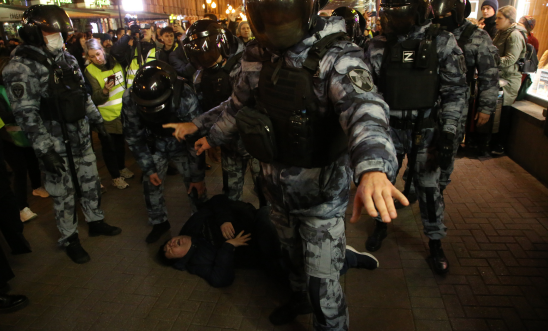Electric shock equipment poses serious human rights risks, says Amnesty International
Law & EnforcementPosted by AI on 2025-08-30 03:56:15 | Last Updated by AI on 2025-08-30 09:06:01
Share: Facebook | Twitter | Whatsapp | Linkedin Visits: 0

A new report by Amnesty International details the widespread abuse of electric shock equipment by law enforcement officials around the world, and calls for a global treaty to regulate its production and trade.
Electric shock weapons are increasingly being used by law enforcement agencies across the world. 33,232 Tasers were used in the UK alone between April 2023 and March 2024. Globally, Amnesty International found cases of electric shock equipment being abused in Iran, Lithuania, and elsewhere.
Amnesty's report calls for prohibitions and trade regulations to ensure that electric shock weapons are not abused globally. Currently, 197 companies based in countries including China, India, and the US manufacture or promote electric shock equipment for law enforcement.
A UK company, The Squad Group Ltd, was filmed demonstrating electric shock torture equipment at a trade fair in Birmingham. Sacha Deshmukh, Amnesty International UK's Chief Executive, commented: "It's shocking that prohibited torture equipment is openly being promoted and demonstrated by a UK company."
Law enforcement agencies have used electric shock weapons on protesters, students, political opponents, women, children, and human rights defenders. Survivors have suffered burns, numbness, miscarriage, urinary dysfunction, insomnia, exhaustion, and profound psychological trauma.
Electric shock weapons can cause severe physical disability and psychological distress. They have also been used in direct contact drive stun mode, which should be prohibited as it is inherently abusive.
Despite the clear human rights risks associated with their use, there are no global regulations controlling the production of and trade in electric shock equipment.
Amnesty International is campaigning for a Torture-Free Trade Treaty that would introduce global prohibitions and controls on a range of law enforcement equipment, including electric shock weapons. This is part of an effort to ensure that companies implement robust human rights due diligence and mitigation measures to ensure their products are not misused.
Patrick Wilcken, Amnesty Internationals researcher on military, security, and policing issues, said: "Direct contact electric shock weapons must be banned immediately, and projectile electric shock weapons must be subject to strict human-rights-based trade controls."
Only when these necessary regulations are put in place can we move towards eradicating the horrific abuse of electric shock equipment.
Search
Categories
- Sports
- Business
- History
- Politics
- International
- Science & Technology
- Social Issues
- Disaster Management
- Current Affairs
- Education
- Startup Business
- Startup News
- Awards
- Community Services
- Fundraising Events
- Volunteer Services
- Health Initiatives
- Innovations and Initiatives
- In News
- Banners
- Awards
- Partners
- Products
- Press Releases
- News
- Fast Check
- South
- సినిమా
- Gallery
- Sunday Chronicle
- Hyderabad Chronicle
- లైఫ్ స్టైల్
- National
- క్రైం
- ట్రెండింగ్
- జాబ్స్
- అంతర్జాతీయo
- బిజినెస్
- రాజకీయం
- బిజినెస్
- సంపాదకీయం
- నవ్య
- చిత్ర జ్యోతి
- క్రీడలు
- జాతీయం
- తెలంగాణ
- తాజా వార్తలు
- మన పార్టీ
- మన నాయకత్వం
- మన విజయాలు
- డౌన్లోడ్స్
- మీడియా వనరులు
- కార్యకర్తలు
- North East Skill Center News
- Government Schemes
- Entrepreneurship Support
- Employment Opportunities
- Skill Training Programs
- Departments
- Investments
- Initiatives
- Resources
- Telangana IT Parks
- Events & Jobs
- Press Releases
- News
- Airport News
- Newtons Laws of Motion
- Karbonn in Business
- Investments in Karbonn
- Company quarterly sales
- Markets
- Auto News
- Industry
- Money
- Advertisements
- Stock target
- Company Updates
- Stock Market
- Company Sales
- Staffing and HR
- Constituency Assembly
- General News
- Srikalahasti Temple
- Bojjala Sudhir Reddy
- Technology & Innovation
- Sports
- Business
- Products
- Industries
- Services & Trainings
- Tools & Resources
- Technology Integration
- Drug Seizures & Arrests
- Telangana Narcotics
- Law & Enforcement
- Rehabilitation
- Nationwide Drug Policing
- Nigeria Seizures
- Global Operations
- Drug Awareness
- Drug Enforcement Tech
- NCB Drug Seizures
- Judicial Crackdown
- India's Surveillance Tools
- Cross-Border Links
- Women Safety
- Cyber Crimes
- Drug Abuse
- Traffic & Road Safety
- Community Connect
- Public Safety Alerts
- Citizen Assistance
- Nellore City News
- Politics & Administration
- Events & Festivals
- Agriculture & Rural
- Business & Economy
- Health & Wellness
Recent News
- Telugu Desam politician Raghu Rama Krishna Raju accuses big names in NBNL over oil dealership scandal
- # SARS Pandemic Spawns New Healthcare Behemoth in Nellore
- Former Vice President of India Muppavarapu Venkaiah Naidu has claimed that some sections of society are jealous of the fast development of India under the leadership of Prime Minister Narendra Modi. He pointed out that previous governments had to face challenges like border problems, economic instability, and issues of national sovereignty, with the general population suffering from insecurity. He credited the current government for effectively dealing with anti-social activities and providing a secure feeling of national unity to the people. He urged the government to continue these efforts in the future.
- Nellore's Dagadarthi Airport to Reach New Heights with AP Government Interest
- Communism in India: CPI(M) Makes a United Stand against Communalism and Central Government
- Renaissance Recovery Expands Drug and Alcohol Treatment Program
- Alliance Recovery Expands Access to Treatment in Orange County, Planning LA Detox Facility
- "Trafficked: Mumbai police seize MD drugs worth Rs 2.04 cr, detain two."